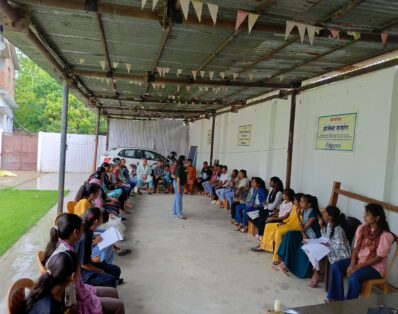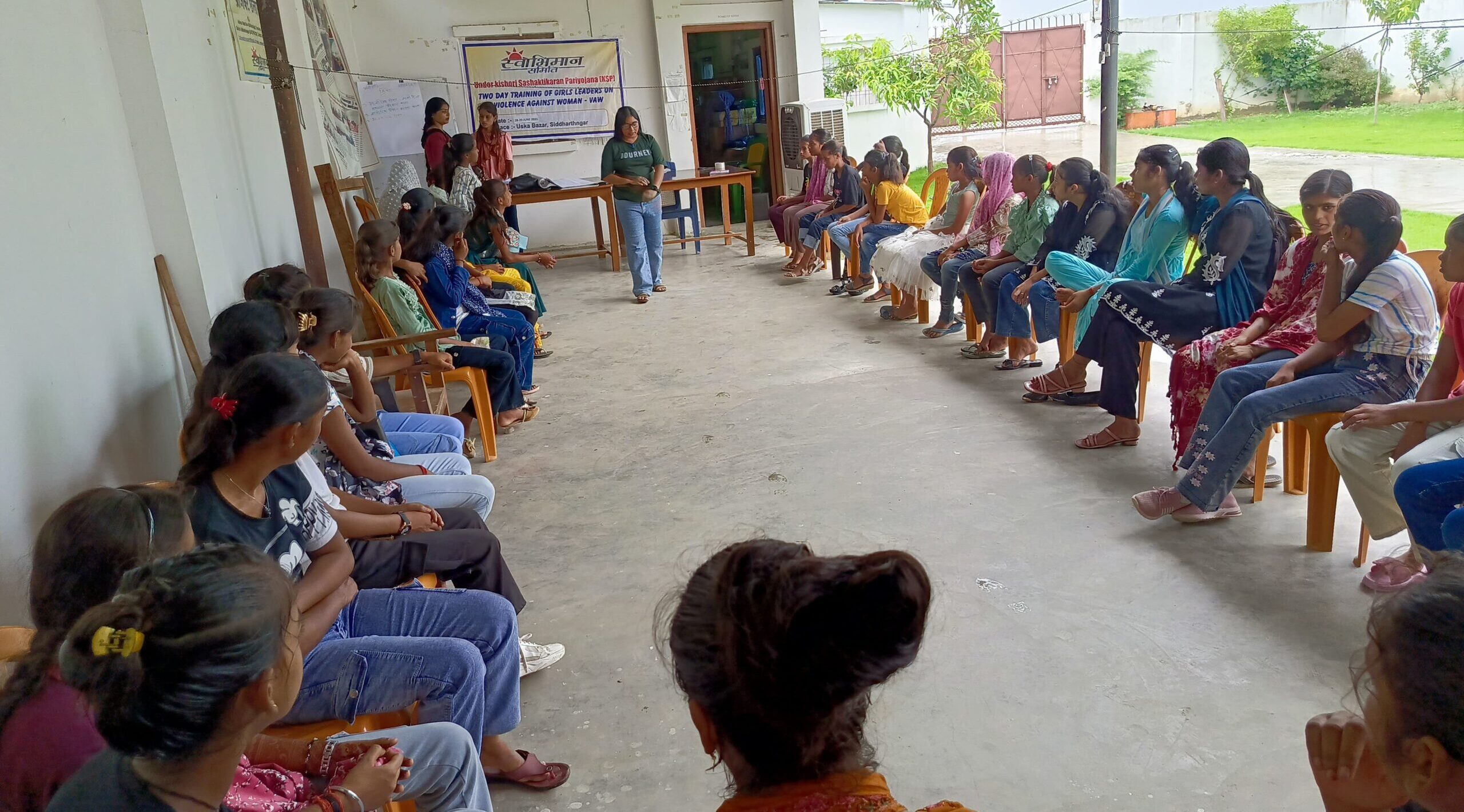Two-Day Group Leaders Training on VAW Under KSP
Swabhiman Samiti’s Training Centre at Uska Bazar hosted a successful two-day Training under its Adolescent Empowerment Project, bringing together 36 young women for in-depth sessions on recognizing and preventing violence. Over June 28 and 29, participants engaged in interactive activities designed to build awareness, foster peer support, and equip them with practical tools to challenge abuse in their communities.
Purpose of the Training
The training was designed to:
- Provide comprehensive knowledge of six forms of violence—physical, psychological, economic, emotional, sexual, and domestic.
- Examine the health, educational, and social consequences of early marriage and gender-based discrimination.
- Develop leadership, communication, and advocacy skills through structured group work and peer-led discussions.
- Create a local support network among participants to encourage ongoing dialogue and mutual assistance beyond the workshop.
- Introduce resources such as helpline numbers, local legal aid services, and safe spaces for reporting incidents.
Session Highlights
- Welcome and Ice-Breakers: Instructor Ms. Sanbhavati opened the workshop with a warm greeting and overview of objectives. Folk artists Sandhya and Pari energized the room with a spirited performance of a traditional awareness song. Ms. Priyanka then facilitated introductions, using a “Find Your Twin” activity where girls paired up to share personal strengths, fostering instant trust and bonding.
- Expert Presentations: Lead trainer Ms. Mamta Verma delivered detailed sessions on each violence category, using case studies drawn from local contexts. She illustrated legal protections under the Protection of Women from Domestic Violence Act and discussed warning signs of coercive control. A dedicated module on the long-term impacts of child marriage highlighted its effects on health, mental well-being, and economic independence.
- Collaborative Group Work: Participants formed four teams to explore violence types—physical, mental, economic, and domestic. Each team analyzed assigned scenarios, brainstormed prevention strategies, and created visual posters summarizing their insights. These posters were later displayed for a gallery walk, allowing cross-group feedback and collective learning.
- Role-Plays and Skill Building: Through role-play exercises, girls practiced safe intervention techniques, “I-statements” for de-escalation, and methods to mobilize trusted adults or community resources. A reflective debrief encouraged them to identify personal action plans for supporting peers.
- Daily Recap and Reflection Circles: At the end of each day, participants gathered in reflection circles to share key learnings, emotional responses, and commitments for the next day, reinforcing retention and peer accountability.
- Closing Ceremony: Ms. Zarina expressed heartfelt gratitude to all attendees, trainers, and special guests—Priyanka, Zarina, Deepak Arya, and Swabhiman Samiti Secretary Mr. Vinod Prajapati—for their unwavering support. Certificates of participation were awarded, acknowledging each girl’s dedication.



Voices of the Participants
- “The gallery walk helped me see diverse perspectives and strengthened my confidence to speak up,” noted Rekha.
- “Learning my legal rights made me feel empowered to seek help,” shared Neha.
Key Takeaways and Guidelines
- Recognize warning signs: sudden isolation, unexplained injuries, or abrupt financial restrictions.
- Build and maintain peer support circles for confidential sharing and mutual encouragement.
- Leverage community resources—helplines, legal aid clinics, and local women’s groups—for guidance and safe reporting.
- Document incidents securely (journals, trusted adult) and consider formal reporting when it’s safe.
- Develop an individualized safety plan: identify allies, safe locations, and exit strategies.
Outcome and Reflection
By the Training end, participants demonstrated heightened self-assurance and a deeper grasp of violence prevention techniques. Post-training evaluations showed a 40% increase in participants’ confidence to intervene safely, and many committed to serving as peer mentors in their schools and villages. Trainers observed a marked shift—from passive learners to proactive advocates—ready to transform awareness into community action.
Final Thoughts
This two-day immersive Training reaffirms Swabhiman Samiti’s commitment to empowering adolescent girls in Siddharthnagar. By coupling knowledge with hands-on practice and peer solidarity, the program has sowed the seeds for a sustainable movement of young leaders championing safe, respectful, and violence-free communities. Follow-up sessions and a dedicated WhatsApp group will ensure continued support, accountability, and resource sharing among participants







